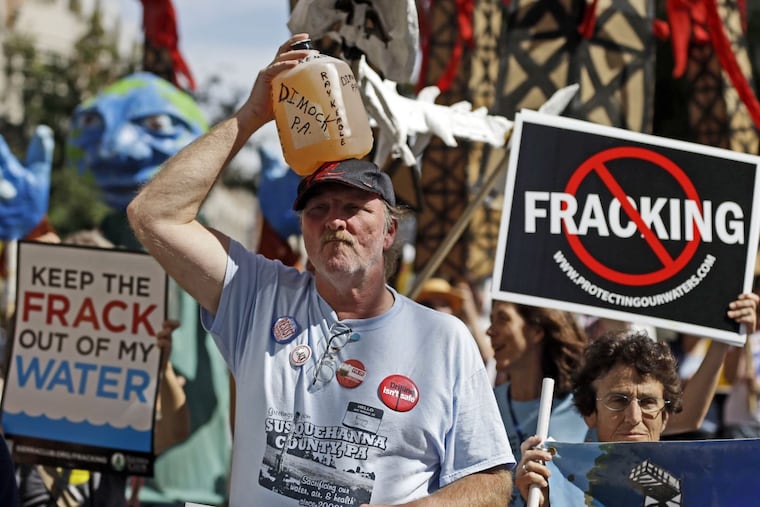Fracking and the environment shouldn't be afterthoughts in Pa. governor race | Editorial
As the campaign to become Pennsylvania's next governor continues, let's hope the candidates will give voters a better idea of what they will specifically do in the next four years, if elected, to protect their air and water while adequately providing for their energy needs.

You can tell the election campaign for governor of Pennsylvania is gaining steam by the dueling TV commercials. These get-to-know-me ads are all style and little substance, but looking at the candidates' websites doesn't provide much more insight into what they would do specifically if elected.
Take protecting Pennsylvania's environment, for example. The topic ranks 10th among important problems facing Pennsylvania in the latest Franklin and Marshall College poll. But when pollsters probed further, they found that 62 percent of respondents think climate change is a problem now, and 69 percent want the state to make renewable energy more available.
Climate change? Renewable energy? You won't see those subjects explored to any appreciable degree on the websites of Republican gubernatorial candidates Laura Ellsworth, Paul Mango, and Scott Wagner. On energy, Mango only says, "We have some of the largest, cheapest deposits of natural gas and coal in the world." Ellsworth and Mango don't even offer that much.
A list of energy accomplishments on Gov. Wolf's website includes a gas drilling moratorium in state parks, a $30 million loan program to encourage solar energy use, joining a three-state effort to ban hydraulic fracturing in the Delaware River Basin, and strengthening weakened environmental rules. The Democrat also says he still wants a fracking tax.
The Franklin and Marshall poll didn't include a question about a fracking tax, but its respondents were queried about the industry generally. Fifty-one percent disapproved of the way the legislature has handled natural gas development; 40 percent disapproved of Wolf's efforts in that regard. Fifty-five percent said they believe the environmental risks of fracking outweigh the economic benefits, and 43 percent have an unfavorable opinion of the industry.
Those negatives certainly suggest fracking should be a larger part of the conversation about who should be governor. Wolf shouldn't let his past failure to get an extraction tax keep him from pressing the topic. His competitors need to make clear where they stand and why.
As the polling shows, it's not enough to tout economic benefits that too few people have felt. Many of the communities so eager to get the jobs and commerce they expected natural gas drilling to bring are now experiencing related pollution and health problems that have changed their attitude.
Former Philadelphia Health Commissioner Walter Tsou, a board member of Philadelphia Physicians for Social Responsibility, calls fracking the "number one public health threat," saying it has been linked to "groundwater contamination, air pollution, radioactivity in flowback water, and even earthquakes."
Taxes, politicians, unemployment, crime, drugs, education, and health care were among the topics ranked higher as problems in the Franklin and Marshall poll. But it's just one way to gauge what a governor should be focused on and what candidates for that office should be talking about. Even when people aren't thinking about the environment, it has a huge impact on their lives.
As the campaign to become Pennsylvania's next governor continues, let's hope the candidates will give voters a better idea of what they will specifically do in the next four years, if elected, to protect the air they breathe and water they drink while adequately providing for their energy needs.